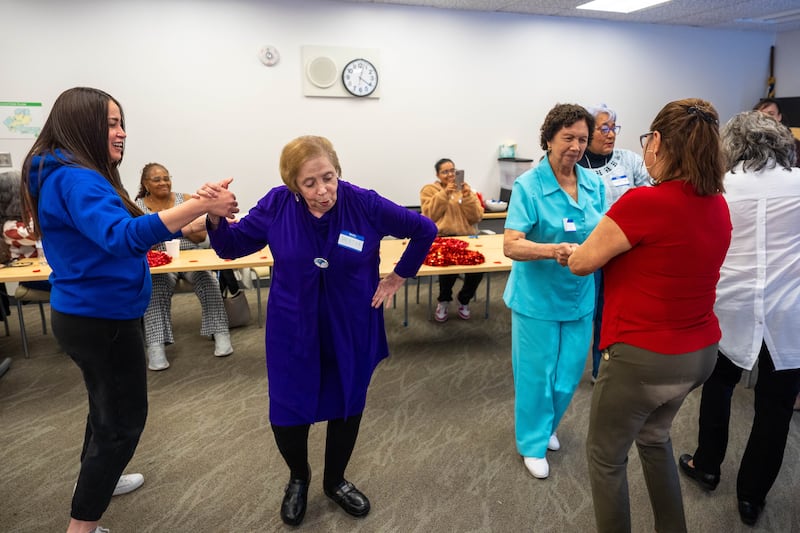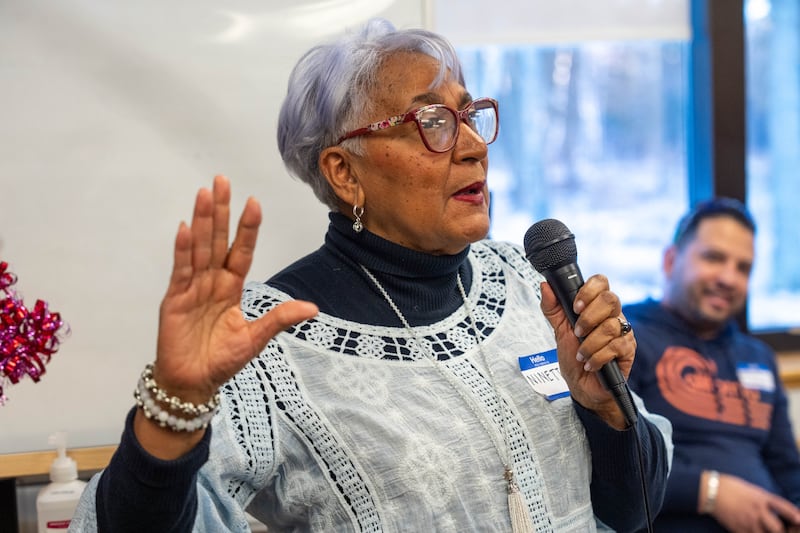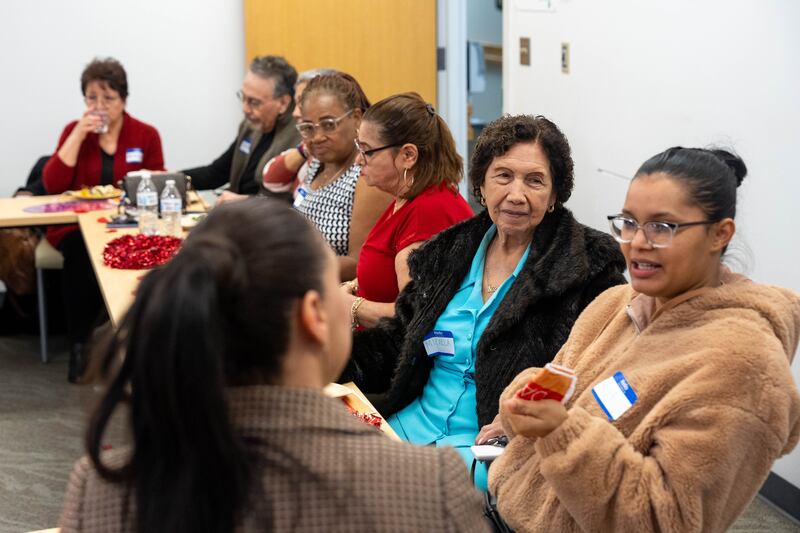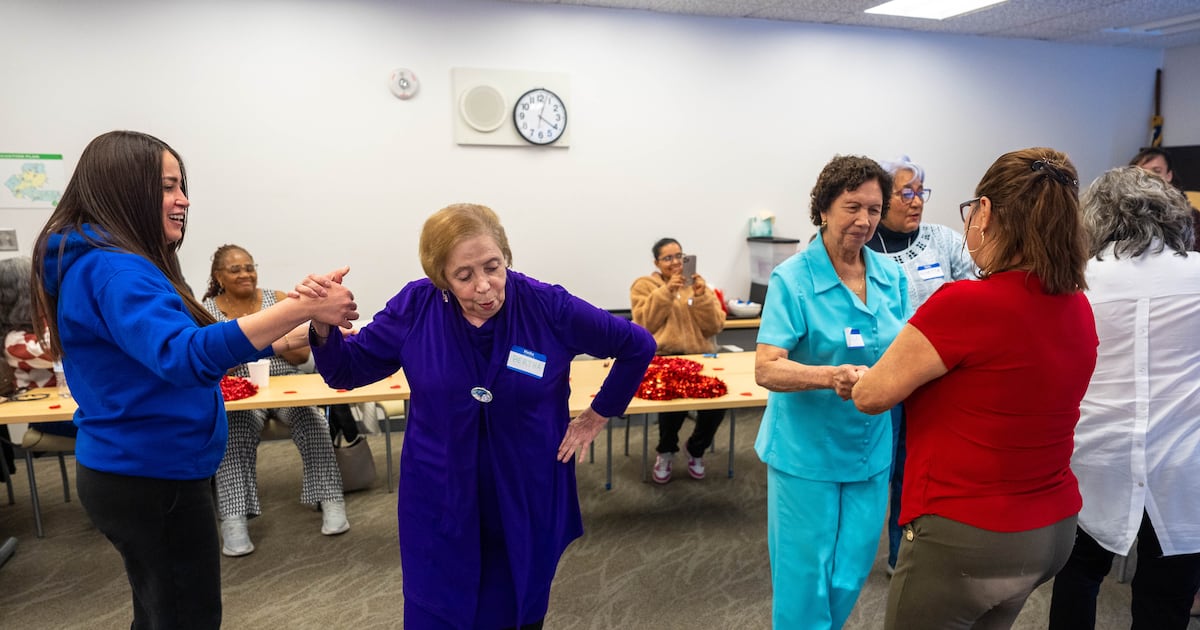 Bertha Emelia Preciado, 86, second from left, and Micaela Arellano, 90, dance during a social group meeting for native Spanish speakers on Tuesday, Feb. 11, at the Anchorage Senior Activity Center. Both women are originally from Mexico. (Loren Holmes / ADN)
Bertha Emelia Preciado, 86, second from left, and Micaela Arellano, 90, dance during a social group meeting for native Spanish speakers on Tuesday, Feb. 11, at the Anchorage Senior Activity Center. Both women are originally from Mexico. (Loren Holmes / ADN)
When merengue music played from the activity room’s speakers at the Anchorage Senior Activity Center, Bertha Emelia Preciado couldn’t resist. The 86-year-old abandoned her coffee and pastries, and stood from her chair without her cane. She closed her eyes and, to the beat of the drum, moved her hands slowly down her body, swiveling her hips. Preciado’s peers — most of them seniors, all of them Latin American — whooped in encouragement, and some joined her on an ad-hoc dance floor.
On Feb. 11, a group of about 20 Latinos age 55 and up met at the center to socialize, dance and share stories in their native Spanish. The group was organized by longtime Anchorage resident Ninetta Regalado, originally from the Dominican Republic, to combat loneliness that can come with age, but also from language isolation.
“The purpose is to speak our language, to listen to our music,” Regalado, who is retired from a career in social services, told the group in Spanish. Residents sat along long tables strewn with decorative flower petals and heart wreaths. “And remember that every one of us has value. We are not alone.”
Chronic loneliness and social isolation can lead to heart disease and depression, according to the Centers for Disease Control and Prevention, and increase the risk of developing dementia by about 50%. Those risks may be exacerbated for Latino seniors, many of whom lack community, don’t speak English and aren’t used to the cold climate, Regalado said. But there’s no program in Anchorage that offers senior activities for Spanish speakers.
So Regalado made one. Previously, she led similar gatherings from her living room, but last Tuesday’s event marked the beginning of a new, every-other-month program she’s organizing called “Encuentro de Hispanos” — Meeting of Hispanics. Informally, she calls them the group of “Accumulated Youth.”
 Ninetta Regalado addresses the group on Feb. 11. (Loren Holmes / ADN)
Ninetta Regalado addresses the group on Feb. 11. (Loren Holmes / ADN)
The Anchorage Senior Activity Center doesn’t currently host programming in languages other than English, said its public relations director, Celine Kaplan. But it’s always willing to offer its space to groups like Regalado’s, she said. Regalado hopes to continue to partner with the Anchorage Senior Activity Center to provide the space, and local nonprofit Enlaces AK to support the cost of transportation, she said.
Participants from the group ranged from their late 50s to their early 90s. They hailed from Mexico, the Dominican Republic, Colombia, Guatemala, Cuba, Costa Rica and Chile.
Many of them have lived in Anchorage for decades, and have had careers, children and lives here. Others immigrated more recently to join family members — or came alone years ago — and are limited by diminishing mobility, health conditions and a language barrier.
All of them, Regalado said, could benefit from some socialization.
This month’s gathering included introductions and sharing, dancing to music from each participant’s home country, and a talk about self-love and harnessing one’s inner power.
Maribel Paulino, a Dominican woman who lives in Anchorage and last year was given a national Lifesaving Award from the Red Cross, left attendees with the message that “every day, every moment, is something to celebrate.”
 People chat during a social group meeting for native Spanish speakers on Feb. 11 at the Anchorage Senior Activity Center. (Loren Holmes / ADN)
People chat during a social group meeting for native Spanish speakers on Feb. 11 at the Anchorage Senior Activity Center. (Loren Holmes / ADN)
Attendees agreed that the gathering marked one of those days and moments.
“I didn’t know what to expect,” 73-year-old Blanca Salazar, originally from Mexico, said of the event. She was invited to attend by a friend from church. She had just exchanged phone numbers with the Colombian woman beside her, who was going to invite her to a Latinos in Alaska Facebook group. “This group is great, especially for people my age to express ourselves and be around people like us.”
Salazar has lived in Anchorage since 1996 with her husband, Frank Salazar, the retired executive chef for the Hotel Captain Cook and the Feb. 11 gathering’s lone male participant.
Others, like Xiomara Díaz Perez, spent most of their life outside of the United States. Diaz is from Cuba, and immigrated to Anchorage six years ago to join her son and his family, she said. She lives alone, and Tuesday’s gathering was an opportunity to meet new people and socialize, she said.
“Everyone has something to learn and share,” said Preciado, who came to Alaska from Mexico with her three children 54 years ago.
Attendees left the meeting with wrapped Valentine’s Day gifts, and the promise of seeing one another again soon. In the meantime, Regalado encouraged them to socialize on their own.
“Leave your house,” she suggested. “Go for a coffee. Meet people.”
